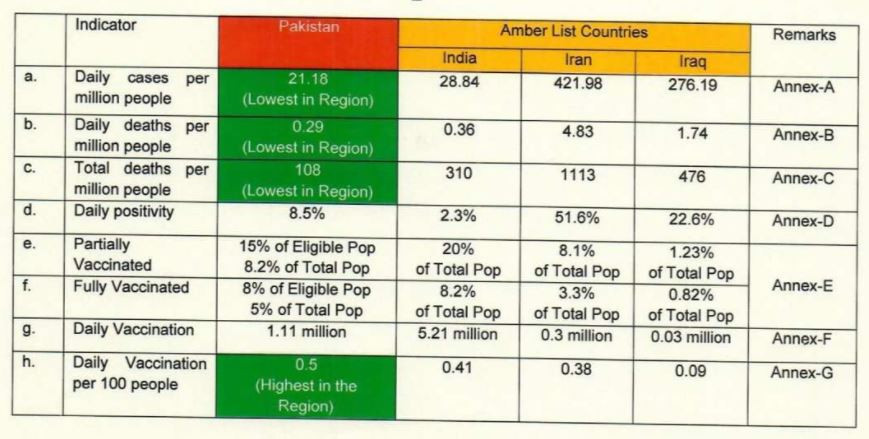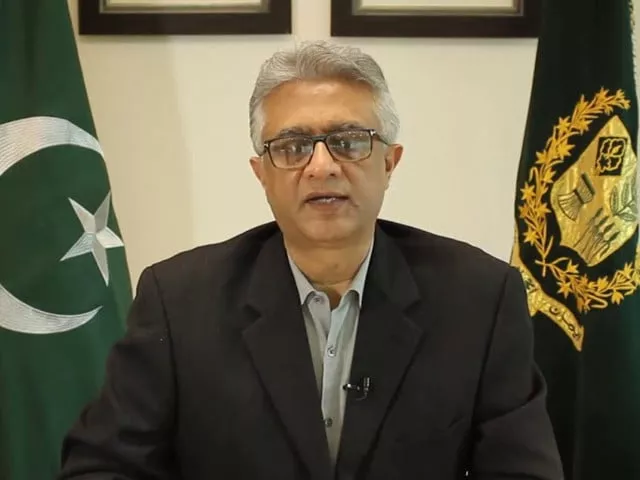Dr Sultan addresses UK's reasoning for keeping Pakistan on the red list
Key indicators show Pakistan fares better than countries on the amber list, says Dr Sultan
ISLAMABAD:Special Assistant to the Prime Minister on Health Dr Faisal Sultan has written a letter to the United Kingdom’s Secretary of State for Health Sajid Javid. The letter was regarding the UK government’s recent decision to retain Pakistan on the 'Red List', while moving other countries, such as India, to the 'Amber List'.
He addressed, in particular, the available information that became the basis for the UK’s decision.
In his letter, Dr Sultan provided data that compared “key indicators from Pakistan and some other countries in the region which currently sit in the ‘Amber List’ in efforts to highlight some obvious disparities”.

The data table in SAPM Dr Sultan's letter. PHOTO: Twitter/ShireenMazari
The table showed that Pakistan had the lowest daily cases, daily deaths, and total deaths per million people in the region. It further indicated that Pakistan had higher daily vaccination per 100 people, within the region.
Pakistan’s data was compared to that of India, Iran and Iraq, all of whom are on the 'Amber List' and have statistically fared worse, according to Dr Sultan.
With regards to the UK’s concern about Pakistan’s testing rates, he said that “the number of tests being done are a large enough sample size to be a sensitive and accurate barometer of the epidemic”.
According to Dr Sultan, the number of tests has “accurately reflected the rise and fall of all the waves seen so far”.
The SAPM on health also listed the various metrics that enhance testing rates and have “risen and fallen in a coherent fashion and with latencies and intervals which fit perfectly well with how the disease progresses clinically”.
He further mentioned that all data and statistics regarding Covid in Pakistan are uploaded daily at the National Command and Operations Centre (NCOC) website.
‘Genomic Surveillance’
He, however, admitted that Pakistan has “limitations in whole genome sequencing throughput” in comparison to the UK, who he dubbed a 'leader' in this arena.
However, the National Institute of Health in Pakistan – along with other collaborators – has sequenced 854 samples during July and August 2021, the details of which are regularly shared with the World Health Organization, he said.
The letter noted that the Delta (Indian) variant is the dominant strain in Pakistan while the Beta variant’s prevalence is no greater than “the global average”.
The premier's aide also offered to share Pakistan’s data results with the UK in real-time to provide better insight.
“However, to introduce genomic sequencing as a performance measure and cite it as a reason to deny travel from Pakistan appears to introduce an unnecessarily large metric," he said adding that security from Covid-19 could be achieved through more target measures.
Dr Sultan questioned if all countries are being subjected to the metric of genomic surveillance.
Pakistan’s Covid response
The SAPM highlighted some salient features of Pakistan’s response to Covid-19, which included “sustainable, data-driven responses and restrictions to bring in a state of normalcy” while pursuing vaccinations.
He mentioned that “vaccinations remain a core pillar of Pakistan’s strategy”, with improving vaccine supplies and the daily vaccination rate increasing to one million doses. 29.7 million people have been vaccinated, with 10.6 million fully vaccinated, he cited.
“The aim is to vaccinate 100 million persons by the end of 2021”, Dr Sultan claimed.
Read Decision to keep Pakistan on red list based on 'data and science': UK
The letter further discussed that the immunization database is linked to the national digital identity and allows for reliable real-time capture of immunization data. This provides visibility of the vaccination drive across the country and ensures accurate data management.
Dr Sultan also spoke of Pakistan’s “centralized and coordinated data management mechanism for testing, contact tracing, quarantine, hospital bed occupancy, deaths and vaccination”, the integration of which into the country's pandemic policy has played a vital role in managing the epidemic.
Furthermore, in efforts to control the influx of the virus via travel, Dr Sultan stated that Pakistan requires pre-travel PCR tests and a rapid antigen test on arrival, including a quarantine period for those who test positive.
Accolades
The SAPM underlined that Pakistan’s anti-Covid efforts have been recognised by the United Nations General Assembly President Volkan Bozkir, who suggested that the nation was a “good example” for the world to follow.
“WHO Director-General Tedros Adhanom Ghebreyesus thought that 'Pakistan was among countries from whom the international community should learn how to deal with the Covid-19 pandemic'”, he added.
The SAPM further mentioned Forbes magazine’s appreciation of Pakistan’s efforts to stabilize and grow the economy during the pandemic, and The Economist ranking Pakistan as 3rd among the best-performing countries for handling the pandemic.
“The World Economic Forum celebrated ‘Pakistan Strategy Day’ to endorse Pakistan’s strategy of handling both corona and the economy”, he said.
‘The way ahead’
According to Dr Sultan, the “shared objective” was to reduce the risk that is involved with international travel.
With regards to Pakistani travellers, “this can be achieved with interventions focused directly on the traveller, rather than on other metrics that will be different and difficult to compare across different countries”, he stated.
Dr Sultan proposed a three-pronged approach of having a WHO-approved Covid-19 vaccine, a PCR test 72 hours prior to departure, and a rapid antigen test at the airport before departure.
Altogether, “these measures ought to be able to provide the health security that we are all collectively seeking”, he wrote.
Dr Sultan assured the UK Secretary of State for Health that he would be happy todiscuss with British experts, the best way to take this forward.
He asserted that Pakistan had no interest in allowing “those of its nationals who pose a health risk to other societies to travel abroad, any more than” allowing entry to those who pose a health risk to Pakistan.
“This is a shared global objective”, he stated.
Reply from Dr Faisal Sultan to UK Health Secretary in response to UK govt's "explanation" (C thread) on why Pak is on Red while India has moved to amber! The table exposes claims of UK govt that UK decision based on science & data! Clearly it has been a purely political decision! pic.twitter.com/5rKE8vFaAh
— Shireen Mazari (@ShireenMazari1) August 10, 2021


COMMENTS
Comments are moderated and generally will be posted if they are on-topic and not abusive.
For more information, please see our Comments FAQ